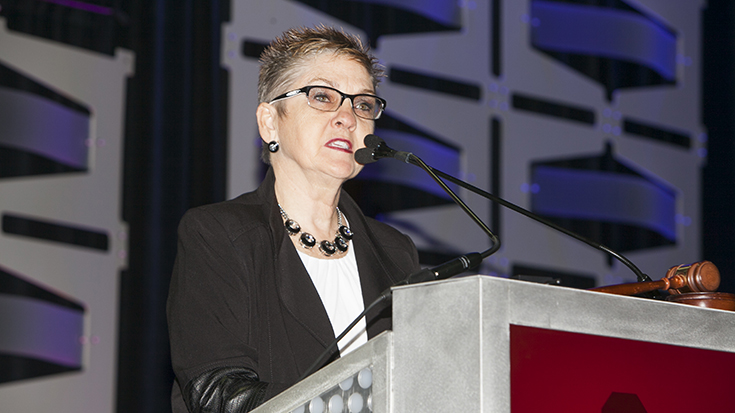
The AARC elected four new officials this fall, and those newly elected officers were officially installed at the AARC Congress in Indianapolis.
It’s only been a week, but they are already hard at work brainstorming ways to advance the profession in 2018.
Ready to make it happen
AARC President-Elect Karen Schell, DHSc, BSRC, RRT, RRT-NPS, RRT-SDS, RPFT, RPSGT, AE-C, CTTS, has big plans to keep the profession moving forward during her tenure in office and sees key areas where work will be needed to get the job done.
“Advancing our education, developing and implementing best practices, and providing research are important to advancing our roles and will secure our future in providing optimal patient care that improves outcomes,” said Dr. Schell, who is the clinical assistant professor of respiratory care at the University of Kansas.
She also wants to increase membership and membership engagement, noting that members have many talents, ideas, and skills to share. “We want you to be part of the road ahead,” she said. “Our future is bright and we can make it happen with your help.”
Dr. Schell encourages members to reach out to her, volunteer, and ask others to join in.
“I hope you are as excited as I am about the road ahead,” she said. “It will be hard work, but I hope we can make it fun along the way.”
His greatest priority
As one of two new directors-at-large on the AARC Board of Directors, Tim Op’t Holt, EdD, RRT, FAARC, believes education is a key objective for the Association.
“Our greatest priority is to continue focusing on the B.S. as the entry-level educational credential,” he said. Patient safety and the value of the RT are top of mind for him as well. “These priorities make a difference for RTs and the patients we serve.”
Dr. Op’t Holt urges all AARC members to familiarize themselves with the goals laid out by AARC President Brian Walsh, PhD, RRT-NPS, FAARC, and do whatever they can in their own organizations to implement them.
“If not for the profession as a whole, then to better yourself – don’t stagnate,” said Dr. Op’t Holt, who is a professor of respiratory care at the University of South Alabama. “Use clinical practice guidelines and evidence-based practice, perform therapy that makes a difference, question the status quo, stand-up for and participate in your profession.”
Be an agent of change
Our other new director-at-large, Lisa Trujillo, DHS, RRT, sees advancing the educational entry as a top priority too.
“We are at a pivotal point in our profession, with great opportunity to expand our educational requirements and potentially the scope of our practice,” said Dr. Trujillo, who is the graduate program director and associate professor at Weber State University. “Although there are several objectives I feel are important, one of my main areas of focus will be to support professional advancement through the further development of a bachelor degree entry to practice and master’s degree.”
She plans to be an agent of change and encourages her fellow AARC members to join her – especially on the state level.
“The AARC needs the active support of state affiliates in order to be successful in national initiatives,” Dr. Trujillo said. “Although much can be done on a national level, many changes that will push our profession forward require the insight, dedication, creativity, motivation, drive, and vision that can only come from a state level.”
Bring on the future
“I am very excited about my career as a respiratory therapist and have found that I enjoy it more the more involved I get,” said Olivia Jenkins, BHS, RRT-NPS, who was elected to serve as chair-elect of the Transport Section. “For this reason I want to help encourage others to get involved as well.”
The critical care transport RT at Children’s Mercy Kansas City loves the energy she sees in the members of her section and wants to capitalize on it by providing more education and resources to help everyone excel as caregivers and leaders in their organizations.
“We are an excited group of people ready to bring on the future of respiratory care, but we can’t do it alone,” Jenkins said. “Always reach out for help to advance your career and your department. We can make a huge difference together.”
